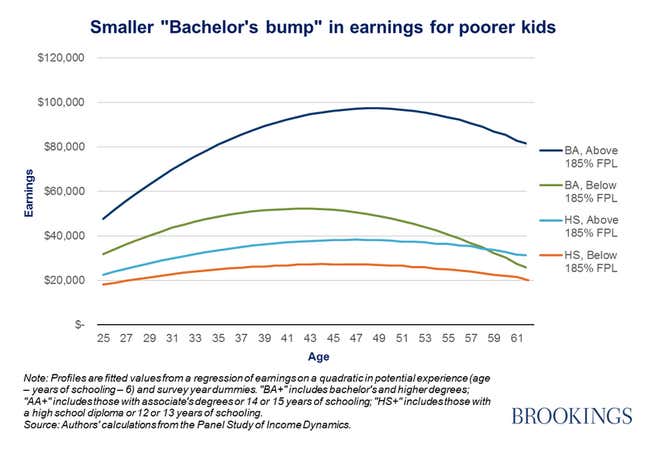People who grow up poor have a far lesser chance of making it to college than wealthy kids. But for the exceptional few who do overcome the disadvantages of their upbringing, a college degree is seen as a ticket to success.
Unfortunately, economists at the Brookings Institution have found that university acceptance isn’t the golden ticket it seems. Not only do poorer kids earn far less than their wealthier counterparts, but their proportional salary increase compared to those from a similar background with no college degree is also far less.
College graduates from families with an income that qualifies them for the federal assisted lunch program earn 91% more over their careers than high school graduates from the same background, reports Brad Hershbein, economist at the W.E. Upjohn Institute for Employment Research & nonresident fellow at Brookings. This is significantly less compared to college graduates who don’t qualify for the assisted lunch program, who earn 162% more over their careers than high school graduates from the same income group.

In fact, the earnings gap between those from wealthy and poor families widens throughout one’s career. At first, college graduates from poorer backgrounds earn around two-thirds of what graduates from more well off families earn. But by mid-career, those from lower income backgrounds make just half of what their wealthier counterparts earn.
Hershbein and his colleagues used data from the longitudinal Panel Study of Income Dynamics, which has been running since 1968, to calculate career earnings, and are now investigating why college isn’t the equalizer it was once thought to be. Theories include the impact of professional networks, whether poorer students attend different colleges, and if less wealthy students have a lower risk tolerance. It’s also possible that, while those from wealthy homes can focus on building their careers post-college and many get help from their families, poorer students have to devote time and resources to supporting their own parents.
It’s widely acknowledged that wealthier students who make it into college have significantly benefited from the resources provided by their background. But it’s deeply troubling to realize that these advantages persist after college. Even among college graduates, family wealth continues to boost earnings throughout a lifetime.




